Unit 8 Is there a post office near here? 知识点精讲课件(人教新目标七年级英语下册)
文档属性
| 名称 | Unit 8 Is there a post office near here? 知识点精讲课件(人教新目标七年级英语下册) | 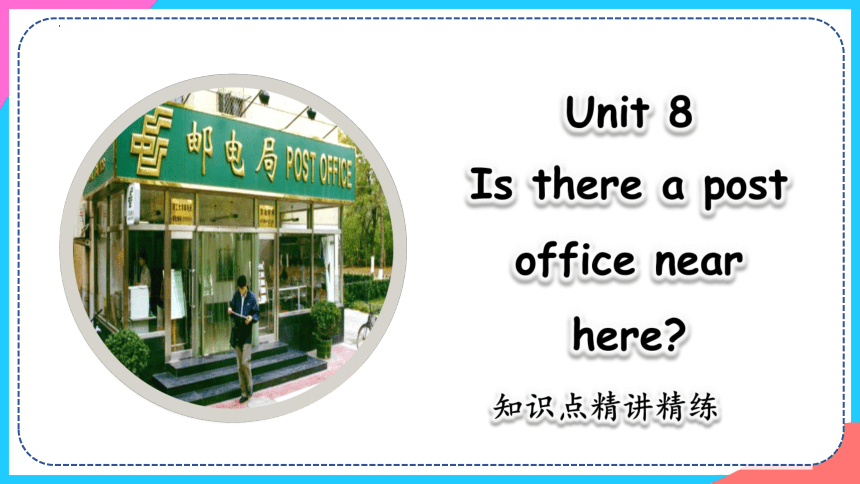 | |
| 格式 | pptx | ||
| 文件大小 | 1.8MB | ||
| 资源类型 | 试卷 | ||
| 版本资源 | 人教新目标(Go for it)版 | ||
| 科目 | 英语 | ||
| 更新时间 | 2024-04-30 21:22:43 | ||
图片预览

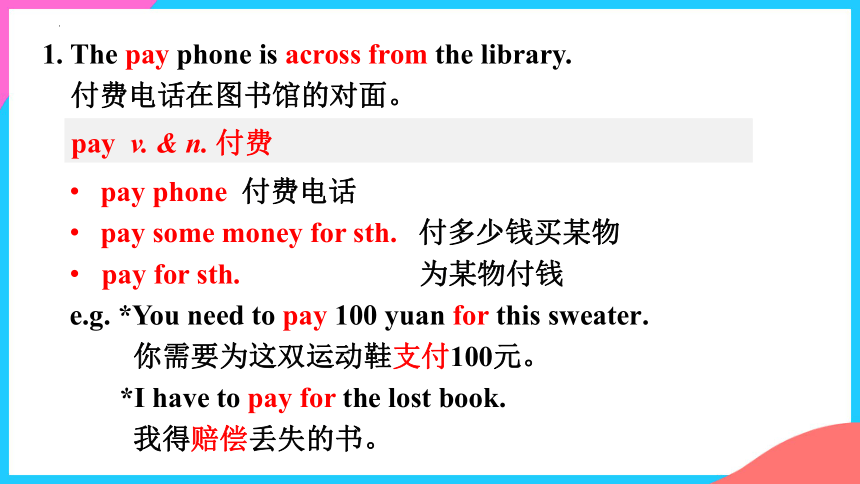
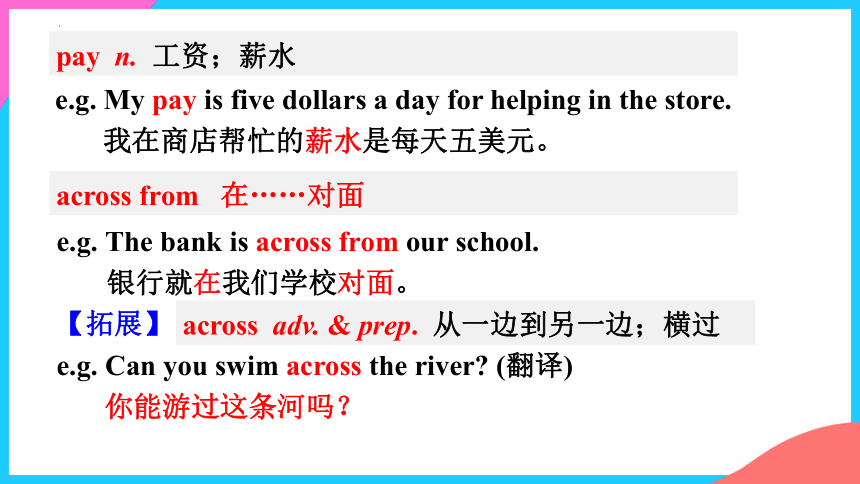
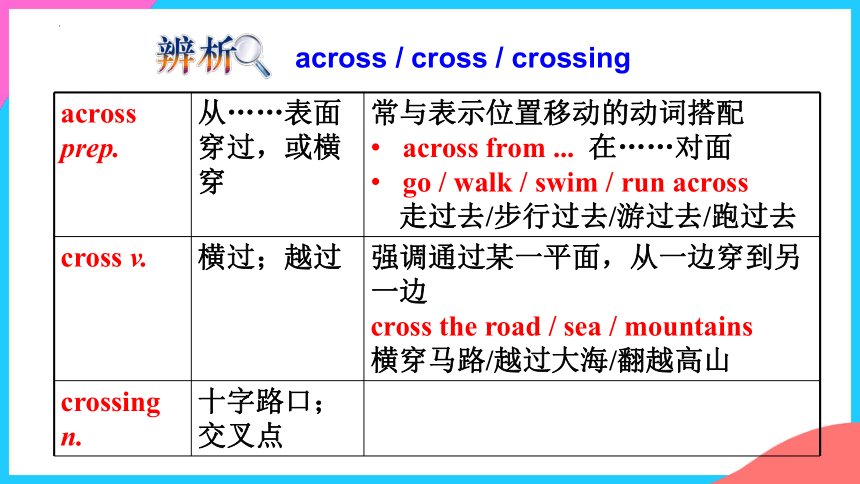
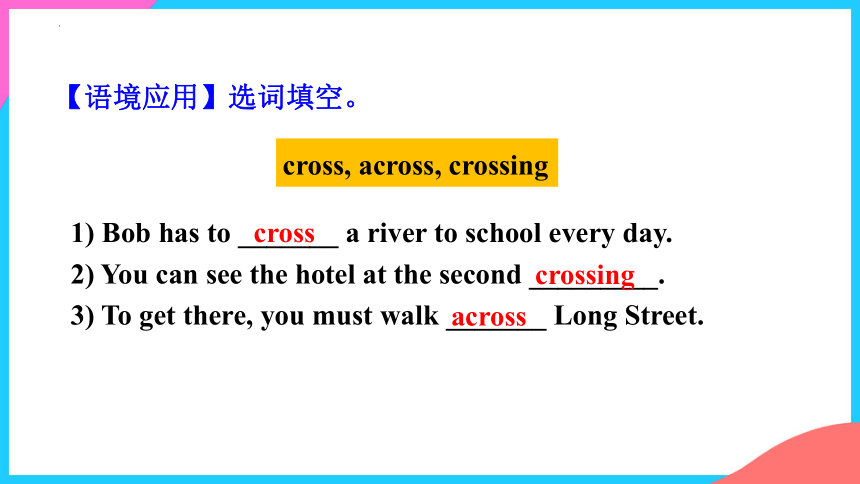
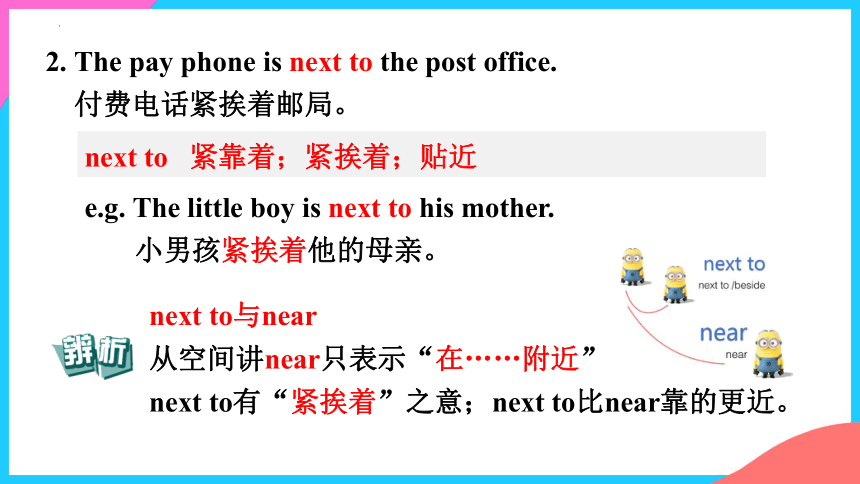
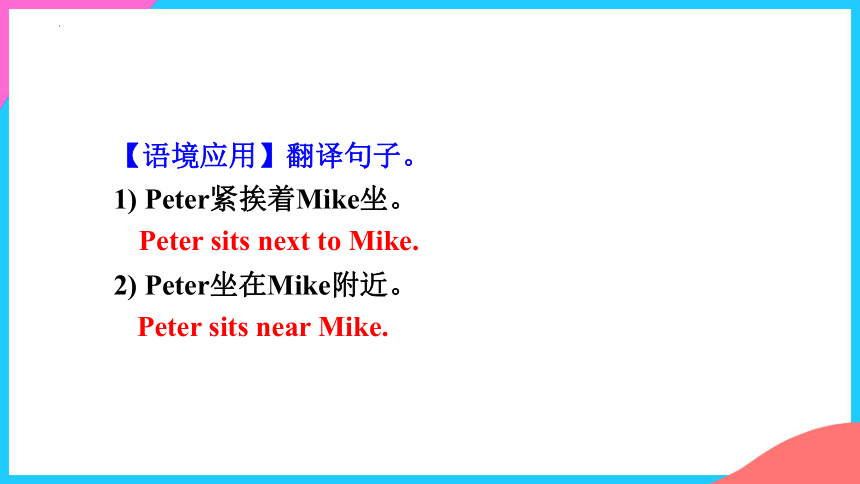
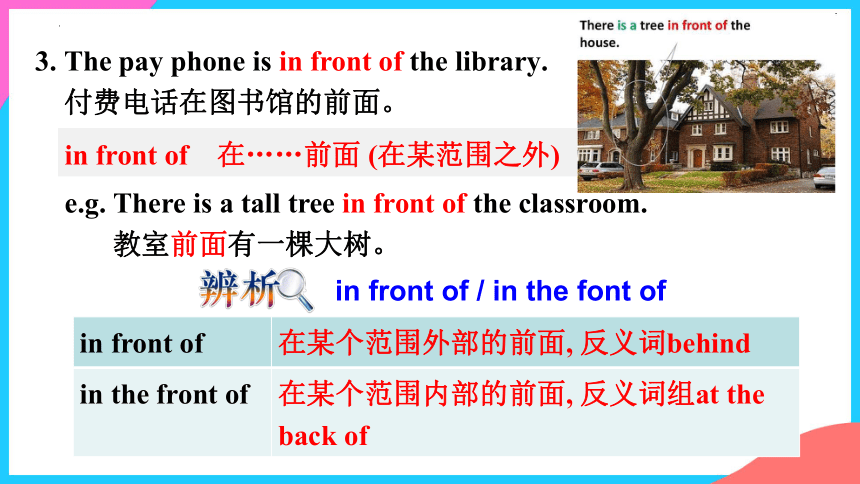
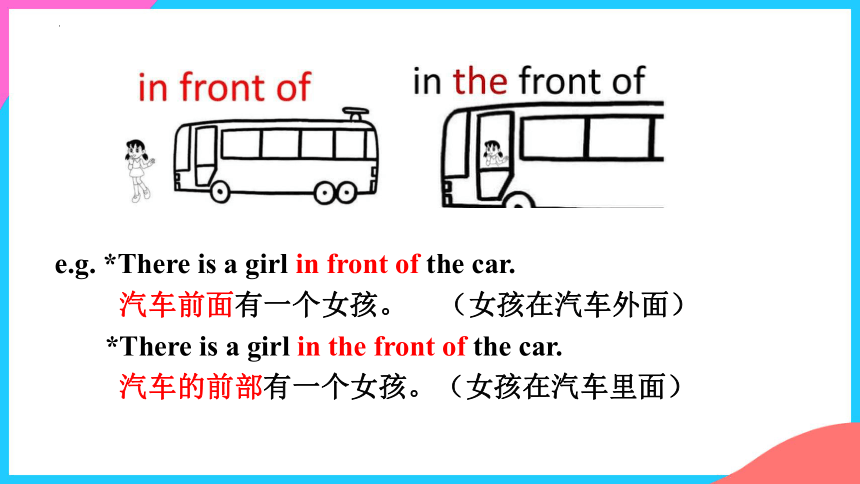
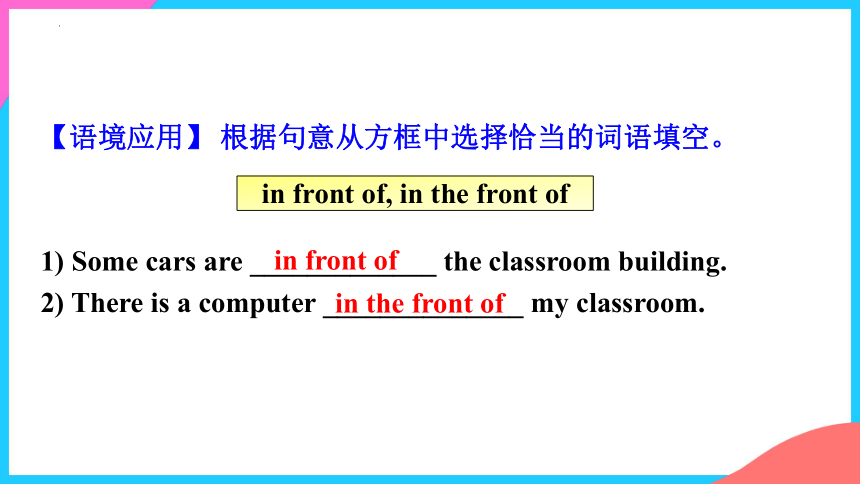
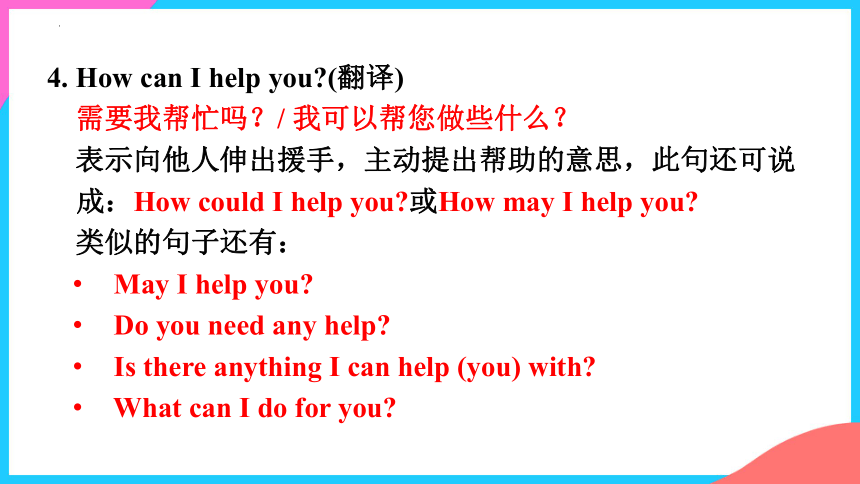
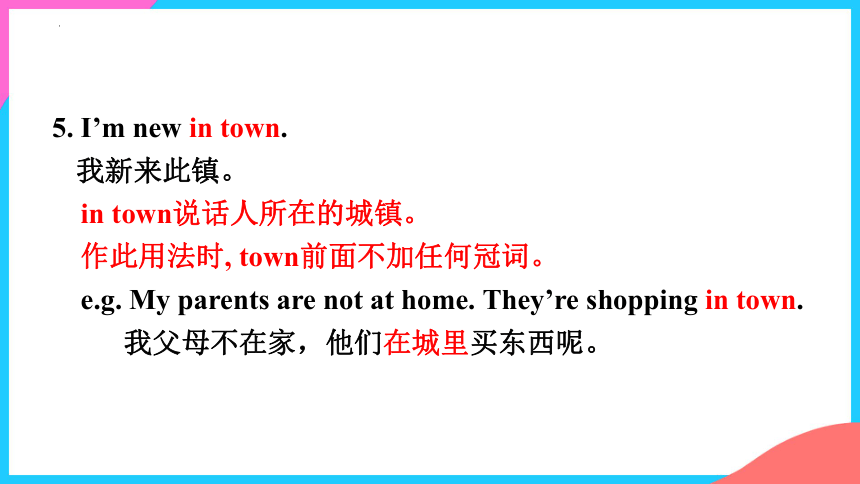
文档简介
(共41张PPT)
Unit 8
Is there a post office near here
知识点精讲精练
1. The pay phone is across from the library.
付费电话在图书馆的对面。
pay v. & n. 付费
pay phone 付费电话
pay some money for sth. 付多少钱买某物
pay for sth. 为某物付钱
e.g. *You need to pay 100 yuan for this sweater.
你需要为这双运动鞋支付100元。
*I have to pay for the lost book.
我得赔偿丢失的书。
e.g. The bank is across from our school.
银行就在我们学校对面。
【拓展】
e.g. Can you swim across the river (翻译)
你能游过这条河吗?
e.g. My pay is five dollars a day for helping in the store.
我在商店帮忙的薪水是每天五美元。
pay n. 工资;薪水
across from 在……对面
across adv. & prep. 从一边到另一边;横过
across prep. 从……表面穿过,或横穿 常与表示位置移动的动词搭配
across from ... 在……对面
go / walk / swim / run across
走过去/步行过去/游过去/跑过去
cross v. 横过;越过 强调通过某一平面,从一边穿到另一边
cross the road / sea / mountains
横穿马路/越过大海/翻越高山
crossing n. 十字路口;交叉点
across / cross / crossing
【语境应用】选词填空。
cross, across, crossing
1) Bob has to _______ a river to school every day.
2) You can see the hotel at the second _________.
3) To get there, you must walk _______ Long Street.
cross
crossing
across
2. The pay phone is next to the post office.
付费电话紧挨着邮局。
next to 紧靠着;紧挨着;贴近
e.g. The little boy is next to his mother.
小男孩紧挨着他的母亲。
next to与near
从空间讲near只表示“在……附近”
next to有“紧挨着”之意;next to比near靠的更近。
【语境应用】翻译句子。
1) Peter紧挨着Mike坐。
2) Peter坐在Mike附近。
Peter sits next to Mike.
Peter sits near Mike.
3. The pay phone is in front of the library.
付费电话在图书馆的前面。
in front of / in the font of
in front of 在某个范围外部的前面, 反义词behind
in the front of 在某个范围内部的前面, 反义词组at the back of
e.g. There is a tall tree in front of the classroom.
教室前面有一棵大树。
in front of 在……前面 (在某范围之外)
e.g. *There is a girl in front of the car.
汽车前面有一个女孩。 (女孩在汽车外面)
*There is a girl in the front of the car.
汽车的前部有一个女孩。(女孩在汽车里面)
【语境应用】 根据句意从方框中选择恰当的词语填空。
1) Some cars are _____________ the classroom building.
2) There is a computer ______________ my classroom.
in front of, in the front of
in front of
in the front of
4. How can I help you (翻译)
需要我帮忙吗?/ 我可以帮您做些什么?
表示向他人伸出援手,主动提出帮助的意思,此句还可说成:How could I help you 或How may I help you
类似的句子还有:
May I help you
Do you need any help
Is there anything I can help (you) with
What can I do for you
5. I’m new in town.
我新来此镇。
in town说话人所在的城镇。
作此用法时, town前面不加任何冠词。
e.g. My parents are not at home. They’re shopping in town.
我父母不在家,他们在城里买东西呢。
6. Is there a bank around here
这附近有银行吗?
around prep. 在……周围
e.g. *There are lots of trees around the playground at our school.
我们学校操场周围有很多树。
*The cat is running around the table.
那只猫围着桌子跑。
e.g. Bob goes home after work at around seven o’clock every evening.
Bob每天晚上七点左右下班回家。
around adv. 在周围;大约 (用在数字之前,与about同义)
【语境应用】写出划线部分的汉语意思。
1) Let's meet at around six o'clock.
2) Is there a pay phone around the bank
3) Don't run around in the classroom.
大约六点钟
在银行周围
跑来跑去
e.g. *在我的铅笔盒里有两块橡皮。
______ ______ two erasers in my pencil box.
*在房子前有一棵高大的树。
______ ______ a tall tree in front of the house.
一、There be ...句型表示“某处有(存在) 某人或某物。
There is
There are
1. 肯定句:There be (is, are) +名词+地点状语
e.g. *大桥街上没有银行。
______ ______ a bank on Bridge Street.
*教室里没有篮球。
______ ______ any basketballs in the classroom.
There isn’t
There aren’t
2. 否定句结构:There isn’t / aren’t…
e.g. *这附近有餐馆吗?
______ ______ a restaurant near here
Yes, there is.
*教室里有学生吗?
______ ______ any students in the classroom
No, there aren’t.
Is there
Are there
3. 一般疑问句:Is/ Are + 主语 +…
肯定:Yes, there is/are.
否定:No, there isn’t/aren’t.
e.g. *紧挨着邮局有一个付费电话。
______ ______ a pay phone next to the post office.
*公园里很多树。
______ ______ many trees in the park.
二、There be 句型中的主谓一致原则
There be句型中be动词的形式要和其后面的主语在人称和数上保持一致。
There is
There are
1) 如果句子的主语是单数可数名词或是不可数名词, be动词用is。
2) 如果句子的主语是复数名词,be动词用are。
e.g. *在桌子上有一个桔子和几根香蕉。
_____ _____ an orange and some bananas on the table.
*在桌子上有几根香蕉和一个桔子。
______ ______ some bananas and an orange on the table.
3) 如果有两个或两个以上的名词作主语,be动词要和最靠近它的主语在数上保持一致,就近原则。
There is
There are
三、There be结构与have的区别
1) have (has)句型: “某人有……” (常用人做主语),表示所属关系
2) there be句型:“某处有某物”,表示存在关系
e.g. *桌子上有一架模型飞机。
______ ______ a model plane on the desk.
*我有一架模型飞机。
______ ______ a model plane.
I have
There is
1. Go along Long Street and it’s on the right.
沿着大桥街走,它就在右边。
Turn right at the first crossing and the restaurant is on your left…
在第一个十字路口向右拐,饭店就在你的左边。
go along/down … 沿着……走 (down和along都是介词用法)
e.g. Go along/down New Street and the park is on the right.
沿着新街走, 公园就在右边。
(这里right和left都是副词,向右;向左。)
e.g. Turn left and you can find that hotel.
向左拐, 你会找到那家旅馆。
turn right/left 向右/左拐
on the right/left 在右面/在左面
on one’s right/left 在某人的右面/左面
e.g. *Walk down this road and the library is on your left.
沿着这条路走, 图书馆就在你的左面。
*There is a bank on the right.
右面有一家银行。
e.g. Turn right at the second crossing.
在第二个十字路口向右拐。
at the first crossing 在第一个十字路口
1. I like to spend time there on weekends.
我喜欢周末时去那看看。
spend v. 花费(时间、钱等)
spend time 花时间
sb. + spend(s) +金钱/时间+ on sth.
某人在某物/某事上花钱/时间
sb. + spend(s) +金钱/时间+ (+in) doing sth.
某人花钱/时间做某事
e.g. *He often spends much money on books.
他经常在书上花很多钱。
*My sister likes to spend the afternoon (in) washing the clothes.
我姐姐喜欢花一下午的时间洗衣服。
*Lucy spends half an hour on / (in) doing her homework every day.
Lucy每天花半小时做作业。
pay表示花费金钱,其主语通常是人
pay some money for sth. 付多少钱买某物
pay for sth. 为某物付钱
take表示花费时间
it takes (sb.) +时间+ to do sth. (it作形式主语,to do sth.作真正的主语) 做某事需要(某人)……时间
cost 多表示花费金钱,主语通常是物
sth. cost(s) (sb.) some money
e.g. *You need to pay 100 yuan for this sweater.
你需要为这个毛衣支付100元。
*It takes Lucy half an hour to do her homework every day.
Lucy每天花半小时做作业。
*The new T shirt will cost Jack 88 yuan.
这件新T恤会花费Jack 88元。
1) Mike never _______ too much time playing computer games.
2) It usually _______ Amy fifteen minutes to walk to school.
3) Do you want to _______ 200 yuan on this dress
4) Jack has to _______ 400 dollars for his favorite bike.
5) That new car will _______ them lots of money.
spends
【语境应用】选词填空。
pay, spend, take, cost
takes
spend
pay
cost
【语境应用】根据句意用take, spend, pay的适当形式填空。
1) She ________ much money on her clothes.
2) It ________ us an hour to walk to the park yesterday.
3) How much did you ________ for these things
spends
took
pay
4) 完成句子
在夜市,人们可以花更少的钱买到他们想要的东面。
At night markets,people can__________ __________ money on what they want. (2020 湖北孝感)
spend less
5) Jim, you’d better not _______ too much time on your mobile phone. (2021江苏连云港中考)
A. cost B. spend C. take D. pay
B
2. To get there, I usually walk out and turn right on Bridge Road.
要去那儿(动物园)的话,我通常步行外出,在大桥路向右拐。
这是英文行文的一种方式,在句子开头用To do…短语,用逗号将其与句子的主体部分隔开,相当于汉语“(若) 要做……的话”。
e.g. *To listen to world news, please key in “1”.
若要收听国际新闻, 请键入“1”。
*To get it right, you must think hard.
要想把它做对,你必须得认真思考。
e.g. 这些书都是免费的。(翻译)
These books are free.
【拓展】free 空闲的;(反义词)busy
e.g. *I’m very busy with school from Monday to Friday, but I have some free time on weekends.
从周一到周五我很忙,但我周末有一些空闲时间。
*Mr. Green isn’t busy this week.
3. The best things in life are free!
生活中最美好的东西是免费的呀!
=Mr. Green is free this week.
free adj. 免费的
4. To get to the park, you just have to cross Center Street.
要去公园的话,你只要穿过中心街就到了。
情态动词have to表达的是“需要”的意思,副词just起加强语气的作用,因此,just have to相当于“只需;仅需”。
e.g. *Do I just have to finish this piece of homework
我只需要做完这个作业吗?
*You don’t have to do it now.
你不需要现在就做的。
5. It is very quiet and I enjoy reading there.
图书馆很安静,我喜欢在那里看书。
enjoy v. 喜爱; 享受
enjoy doing… 从中得到乐趣;欣赏;喜欢
e.g. *My grandfather enjoys the quiet park.
我爷爷喜欢这个安静的公园。
*I enjoy playing basketball every afternoon.
我喜欢每天下午打篮球。
*Do you enjoy yourself at the party
你在聚会上玩得开心吗?
enjoy v.
enjoy sth. 喜欢某物,后接名词或代词作宾语
enjoy doing sth. 喜欢做某事,后接动名词作宾语
enjoy oneself = have a good time/ have fun 玩的高兴
【拓展】+动名词作宾语
+ doing sth.
enjoy
mind
practice
avoid
consider
喜欢做某事
介意做某事
练习做某事
避免做某事
考虑做某事
keep
继续做某事
【语境应用】完成句子。
1) 看!孩子们在操场上玩得非常开心。
Look! The children _______ _________ __________ on the playground.
2) 女孩子们都喜欢穿裙子。
The girls all _________ ________ skirts.
3) 他们正躺在沙滩上享受阳光。
They are lying on the beach and _________ _______ _______.
themselves
enjoy/like wearing
enjoying the sun
are enjoying
1) 完成句子 (2021江苏扬州中考)
Jack enjoys _____________ and sunbathing with his friends. (游泳)
2) 完成句子 (2021江苏宿迁中考)
Look! The children are enjoying ___________(他们自己) in the playground. How happy they are!
3) 完成句子 (2021江苏南京)
Tony's sister enjoys _________ (listen) to music and she often goes to concerts.
listening
swimming
themselves
Unit 8
Is there a post office near here
知识点精讲精练
1. The pay phone is across from the library.
付费电话在图书馆的对面。
pay v. & n. 付费
pay phone 付费电话
pay some money for sth. 付多少钱买某物
pay for sth. 为某物付钱
e.g. *You need to pay 100 yuan for this sweater.
你需要为这双运动鞋支付100元。
*I have to pay for the lost book.
我得赔偿丢失的书。
e.g. The bank is across from our school.
银行就在我们学校对面。
【拓展】
e.g. Can you swim across the river (翻译)
你能游过这条河吗?
e.g. My pay is five dollars a day for helping in the store.
我在商店帮忙的薪水是每天五美元。
pay n. 工资;薪水
across from 在……对面
across adv. & prep. 从一边到另一边;横过
across prep. 从……表面穿过,或横穿 常与表示位置移动的动词搭配
across from ... 在……对面
go / walk / swim / run across
走过去/步行过去/游过去/跑过去
cross v. 横过;越过 强调通过某一平面,从一边穿到另一边
cross the road / sea / mountains
横穿马路/越过大海/翻越高山
crossing n. 十字路口;交叉点
across / cross / crossing
【语境应用】选词填空。
cross, across, crossing
1) Bob has to _______ a river to school every day.
2) You can see the hotel at the second _________.
3) To get there, you must walk _______ Long Street.
cross
crossing
across
2. The pay phone is next to the post office.
付费电话紧挨着邮局。
next to 紧靠着;紧挨着;贴近
e.g. The little boy is next to his mother.
小男孩紧挨着他的母亲。
next to与near
从空间讲near只表示“在……附近”
next to有“紧挨着”之意;next to比near靠的更近。
【语境应用】翻译句子。
1) Peter紧挨着Mike坐。
2) Peter坐在Mike附近。
Peter sits next to Mike.
Peter sits near Mike.
3. The pay phone is in front of the library.
付费电话在图书馆的前面。
in front of / in the font of
in front of 在某个范围外部的前面, 反义词behind
in the front of 在某个范围内部的前面, 反义词组at the back of
e.g. There is a tall tree in front of the classroom.
教室前面有一棵大树。
in front of 在……前面 (在某范围之外)
e.g. *There is a girl in front of the car.
汽车前面有一个女孩。 (女孩在汽车外面)
*There is a girl in the front of the car.
汽车的前部有一个女孩。(女孩在汽车里面)
【语境应用】 根据句意从方框中选择恰当的词语填空。
1) Some cars are _____________ the classroom building.
2) There is a computer ______________ my classroom.
in front of, in the front of
in front of
in the front of
4. How can I help you (翻译)
需要我帮忙吗?/ 我可以帮您做些什么?
表示向他人伸出援手,主动提出帮助的意思,此句还可说成:How could I help you 或How may I help you
类似的句子还有:
May I help you
Do you need any help
Is there anything I can help (you) with
What can I do for you
5. I’m new in town.
我新来此镇。
in town说话人所在的城镇。
作此用法时, town前面不加任何冠词。
e.g. My parents are not at home. They’re shopping in town.
我父母不在家,他们在城里买东西呢。
6. Is there a bank around here
这附近有银行吗?
around prep. 在……周围
e.g. *There are lots of trees around the playground at our school.
我们学校操场周围有很多树。
*The cat is running around the table.
那只猫围着桌子跑。
e.g. Bob goes home after work at around seven o’clock every evening.
Bob每天晚上七点左右下班回家。
around adv. 在周围;大约 (用在数字之前,与about同义)
【语境应用】写出划线部分的汉语意思。
1) Let's meet at around six o'clock.
2) Is there a pay phone around the bank
3) Don't run around in the classroom.
大约六点钟
在银行周围
跑来跑去
e.g. *在我的铅笔盒里有两块橡皮。
______ ______ two erasers in my pencil box.
*在房子前有一棵高大的树。
______ ______ a tall tree in front of the house.
一、There be ...句型表示“某处有(存在) 某人或某物。
There is
There are
1. 肯定句:There be (is, are) +名词+地点状语
e.g. *大桥街上没有银行。
______ ______ a bank on Bridge Street.
*教室里没有篮球。
______ ______ any basketballs in the classroom.
There isn’t
There aren’t
2. 否定句结构:There isn’t / aren’t…
e.g. *这附近有餐馆吗?
______ ______ a restaurant near here
Yes, there is.
*教室里有学生吗?
______ ______ any students in the classroom
No, there aren’t.
Is there
Are there
3. 一般疑问句:Is/ Are + 主语 +…
肯定:Yes, there is/are.
否定:No, there isn’t/aren’t.
e.g. *紧挨着邮局有一个付费电话。
______ ______ a pay phone next to the post office.
*公园里很多树。
______ ______ many trees in the park.
二、There be 句型中的主谓一致原则
There be句型中be动词的形式要和其后面的主语在人称和数上保持一致。
There is
There are
1) 如果句子的主语是单数可数名词或是不可数名词, be动词用is。
2) 如果句子的主语是复数名词,be动词用are。
e.g. *在桌子上有一个桔子和几根香蕉。
_____ _____ an orange and some bananas on the table.
*在桌子上有几根香蕉和一个桔子。
______ ______ some bananas and an orange on the table.
3) 如果有两个或两个以上的名词作主语,be动词要和最靠近它的主语在数上保持一致,就近原则。
There is
There are
三、There be结构与have的区别
1) have (has)句型: “某人有……” (常用人做主语),表示所属关系
2) there be句型:“某处有某物”,表示存在关系
e.g. *桌子上有一架模型飞机。
______ ______ a model plane on the desk.
*我有一架模型飞机。
______ ______ a model plane.
I have
There is
1. Go along Long Street and it’s on the right.
沿着大桥街走,它就在右边。
Turn right at the first crossing and the restaurant is on your left…
在第一个十字路口向右拐,饭店就在你的左边。
go along/down … 沿着……走 (down和along都是介词用法)
e.g. Go along/down New Street and the park is on the right.
沿着新街走, 公园就在右边。
(这里right和left都是副词,向右;向左。)
e.g. Turn left and you can find that hotel.
向左拐, 你会找到那家旅馆。
turn right/left 向右/左拐
on the right/left 在右面/在左面
on one’s right/left 在某人的右面/左面
e.g. *Walk down this road and the library is on your left.
沿着这条路走, 图书馆就在你的左面。
*There is a bank on the right.
右面有一家银行。
e.g. Turn right at the second crossing.
在第二个十字路口向右拐。
at the first crossing 在第一个十字路口
1. I like to spend time there on weekends.
我喜欢周末时去那看看。
spend v. 花费(时间、钱等)
spend time 花时间
sb. + spend(s) +金钱/时间+ on sth.
某人在某物/某事上花钱/时间
sb. + spend(s) +金钱/时间+ (+in) doing sth.
某人花钱/时间做某事
e.g. *He often spends much money on books.
他经常在书上花很多钱。
*My sister likes to spend the afternoon (in) washing the clothes.
我姐姐喜欢花一下午的时间洗衣服。
*Lucy spends half an hour on / (in) doing her homework every day.
Lucy每天花半小时做作业。
pay表示花费金钱,其主语通常是人
pay some money for sth. 付多少钱买某物
pay for sth. 为某物付钱
take表示花费时间
it takes (sb.) +时间+ to do sth. (it作形式主语,to do sth.作真正的主语) 做某事需要(某人)……时间
cost 多表示花费金钱,主语通常是物
sth. cost(s) (sb.) some money
e.g. *You need to pay 100 yuan for this sweater.
你需要为这个毛衣支付100元。
*It takes Lucy half an hour to do her homework every day.
Lucy每天花半小时做作业。
*The new T shirt will cost Jack 88 yuan.
这件新T恤会花费Jack 88元。
1) Mike never _______ too much time playing computer games.
2) It usually _______ Amy fifteen minutes to walk to school.
3) Do you want to _______ 200 yuan on this dress
4) Jack has to _______ 400 dollars for his favorite bike.
5) That new car will _______ them lots of money.
spends
【语境应用】选词填空。
pay, spend, take, cost
takes
spend
pay
cost
【语境应用】根据句意用take, spend, pay的适当形式填空。
1) She ________ much money on her clothes.
2) It ________ us an hour to walk to the park yesterday.
3) How much did you ________ for these things
spends
took
pay
4) 完成句子
在夜市,人们可以花更少的钱买到他们想要的东面。
At night markets,people can__________ __________ money on what they want. (2020 湖北孝感)
spend less
5) Jim, you’d better not _______ too much time on your mobile phone. (2021江苏连云港中考)
A. cost B. spend C. take D. pay
B
2. To get there, I usually walk out and turn right on Bridge Road.
要去那儿(动物园)的话,我通常步行外出,在大桥路向右拐。
这是英文行文的一种方式,在句子开头用To do…短语,用逗号将其与句子的主体部分隔开,相当于汉语“(若) 要做……的话”。
e.g. *To listen to world news, please key in “1”.
若要收听国际新闻, 请键入“1”。
*To get it right, you must think hard.
要想把它做对,你必须得认真思考。
e.g. 这些书都是免费的。(翻译)
These books are free.
【拓展】free 空闲的;(反义词)busy
e.g. *I’m very busy with school from Monday to Friday, but I have some free time on weekends.
从周一到周五我很忙,但我周末有一些空闲时间。
*Mr. Green isn’t busy this week.
3. The best things in life are free!
生活中最美好的东西是免费的呀!
=Mr. Green is free this week.
free adj. 免费的
4. To get to the park, you just have to cross Center Street.
要去公园的话,你只要穿过中心街就到了。
情态动词have to表达的是“需要”的意思,副词just起加强语气的作用,因此,just have to相当于“只需;仅需”。
e.g. *Do I just have to finish this piece of homework
我只需要做完这个作业吗?
*You don’t have to do it now.
你不需要现在就做的。
5. It is very quiet and I enjoy reading there.
图书馆很安静,我喜欢在那里看书。
enjoy v. 喜爱; 享受
enjoy doing… 从中得到乐趣;欣赏;喜欢
e.g. *My grandfather enjoys the quiet park.
我爷爷喜欢这个安静的公园。
*I enjoy playing basketball every afternoon.
我喜欢每天下午打篮球。
*Do you enjoy yourself at the party
你在聚会上玩得开心吗?
enjoy v.
enjoy sth. 喜欢某物,后接名词或代词作宾语
enjoy doing sth. 喜欢做某事,后接动名词作宾语
enjoy oneself = have a good time/ have fun 玩的高兴
【拓展】+动名词作宾语
+ doing sth.
enjoy
mind
practice
avoid
consider
喜欢做某事
介意做某事
练习做某事
避免做某事
考虑做某事
keep
继续做某事
【语境应用】完成句子。
1) 看!孩子们在操场上玩得非常开心。
Look! The children _______ _________ __________ on the playground.
2) 女孩子们都喜欢穿裙子。
The girls all _________ ________ skirts.
3) 他们正躺在沙滩上享受阳光。
They are lying on the beach and _________ _______ _______.
themselves
enjoy/like wearing
enjoying the sun
are enjoying
1) 完成句子 (2021江苏扬州中考)
Jack enjoys _____________ and sunbathing with his friends. (游泳)
2) 完成句子 (2021江苏宿迁中考)
Look! The children are enjoying ___________(他们自己) in the playground. How happy they are!
3) 完成句子 (2021江苏南京)
Tony's sister enjoys _________ (listen) to music and she often goes to concerts.
listening
swimming
themselves
同课章节目录
- Unit 1 Can you play the guitar?
- Section A
- Section B
- Unit 2 What time do you go to school?
- Section A
- Section B
- Unit 3 How do you get to school?
- Section A
- Section B
- Unit 4 Don't eat in class.
- Section A
- Section B
- Unit 5 Why do you like pandas?
- Section A
- Section B
- Unit 6 I'm watching TV.
- Section A
- Section B
- Review of Units 1-6
- Unit 7 It's raining!
- Section A
- Section B
- Unit 8 Is there a post office near here?
- Section A
- Section B
- Unit 9 What does he look like?
- Section A
- Section B
- Unit 10 I'd like some noodles.
- Section A
- Section B
- Unit 11 How was your school trip?
- Section A
- Section B
- Unit 12 What did you do last weekend?
- Section A
- Section B
